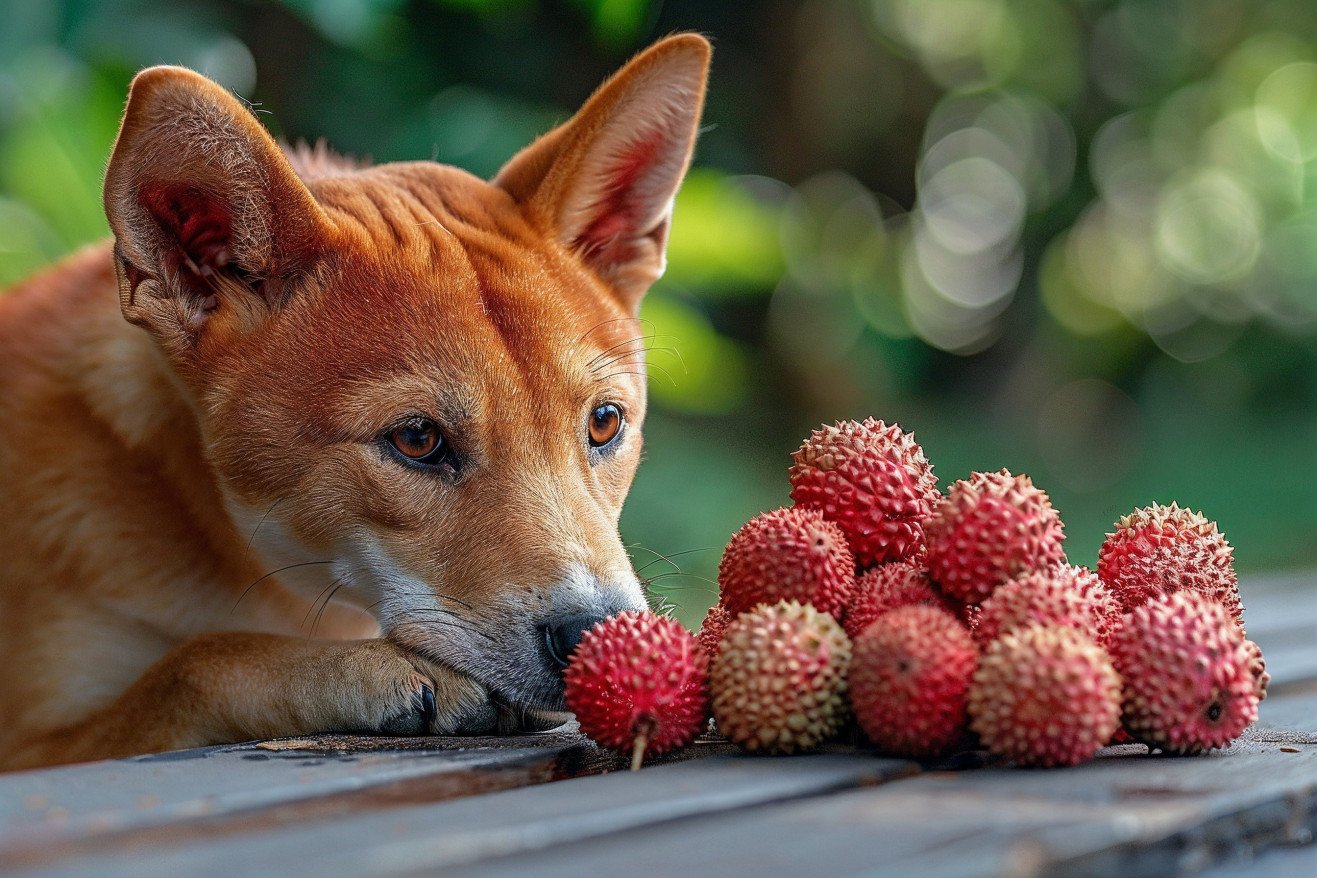Can Dogs Eat Lychee? Understanding the Risks and Alternatives
27 February 2024 • Updated 26 February 2024

Lychee: a delicious tropical fruit for people, but is it safe for dogs to eat? Dogs can eat lychee in moderation as long as it’s ripe and peeled and the seed is removed, which can be a choking hazard. Still, because of its sugar content and other potential risks, it’s better to stick to other fruits like apples or blueberries.
In the sections that follow, we will take you through a range of veterinary opinions, nutritional studies, and animal behavior research. This interdisciplinary approach will allow us to take a closer look at the pros and cons of giving dogs lychee, as well as explore how the sugars in fruit impact dogs’ bodies.
By learning about the nutritional content of lychee, you can learn more about whether it’s a good idea to give your dog this fruit as a treat, and make sure that you have the information you need to make the best choices for your dog’s snacks.
Can dogs eat lychee?
Nutritional Value of Lychee for Dogs
Lychee, a small tropical fruit in the soapberry family, is known for its sweet, floral flavor. According to Healthline, lychee is made up mostly of water and carbohydrates, with 16.5 grams of carbs and 66 calories in a 100-gram serving. It’s also high in sugar, with 15.2 grams of sugar and 1.3 grams of fiber.
Lychee is a good source of Vitamin C, with one lychee providing about 9% of the Daily Reference Intake, and it also contains copper and potassium, both of which are important minerals for the body.
Lychee has been shown to have health benefits because of its antioxidants, including epicatechin and rutin, which can help protect against chronic diseases like cancer, diabetes, and heart disease. However, in terms of dogs, the high sugar content is a concern. Too much sugar can lead to obesity, dental issues, and, in the long term, it can even increase the risk of diabetes.
In addition, unripe lychees contain Hypoglycin A, a toxin that has been linked to severe hypoglycemia and other health problems. There have been reports of the toxin causing encephalopathy in malnourished children in South Asia who ate unripe lychees on an empty stomach. The effects of Hypoglycin A in dogs aren’t well-studied, but it’s possible that it could have similar effects, so it’s best to be cautious.
Understanding the Role of Fruits in a Dog’s Diet
Dogs are omnivores, which means they need a diet that includes both animal and plant-based products. While dogs don’t have a specific nutritional need for fruits, the American Kennel Club and Forbes explain that fruits can provide dogs with vitamins, minerals, and hydration.
That said, it’s important to feed fruits to dogs in moderation. Some fruits that are safe for dogs to eat include apples, bananas, blueberries, and watermelon, as long as the fruit is seedless and the rind is removed to prevent choking.
Dogs’ digestive systems are different from humans’ in that they are shorter, which means food moves through their bodies faster and they have less time to absorb the nutrients from plant-based foods.
This is why it’s important to feed dogs high-sugar fruits like lychee in moderation, as their bodies aren’t equipped to process sugar in the same way humans’ bodies are. As Purina explains, fruits should be fed to dogs as a treat rather than as a regular part of their diet to prevent potential health problems like obesity and diabetes.
Because of its high sugar content and the fact that it contains Hypoglycin A when it’s unripe, lychee should be fed to dogs with caution. This information about dogs’ dietary needs and limitations will help ensure that when we share a fruity snack with our furry friends, it will have a positive impact on their health.
The Metabolic Impact of Sugar on Dogs
While sugar is not toxic to dogs, it can lead to a number of metabolic and health issues when consumed in high amounts. Dogs, like humans, can suffer from obesity, dental issues, hormonal imbalances, and most notably, diabetes as a result of a high-sugar diet.
PR Newswire reported on a study that found that diabetes in pets in the US is on the rise, and there is a strong association between the disease and a high-sugar diet. A dog’s metabolism is not designed to handle the simple carbohydrates found in sugary treats and some dog foods, which can lead to blood sugar spikes.
These spikes can cause weight gain and, in the long term, may lead to insulin resistance, which can result in type II diabetes, especially in older and obese dogs.
Veterinary professionals, with the backing of a study from VCA Hospitals, have warned against feeding dogs high-sugar fruits on a regular basis. It’s important to keep sugar consumption in check and stick to low-sugar fruits like blueberries or apples.
These fruits can be fed in small amounts and provide natural sugars and essential vitamins and minerals, which is a much better option for a dog’s metabolic health. While we may love the taste of lychee, it’s important to think about the potential impact it could have on our dogs’ long-term health.
How to Identify and Deal With Lychee Poisoning in Dogs
There are a number of potential health risks for dogs associated with eating lychee, especially if they eat unripe fruit or parts of the fruit that are not meant to be eaten, like the skin and the seed.
DogTime notes that if a dog eats unripe lychee, which is high in Hypoglycin A, or consumes the large seeds, which contain saponin, the results can be as minor as a choking hazard or as major as internal damage.
Salon Privé Magazine also points out the danger of Hypoglycin A, which can cause a sudden drop in blood glucose levels, leading to hypoglycemia.
Symptoms to look out for include weakness, confusion, extreme drooling, muscle spasms, seizures, stomach cramps, and vomiting. According to Hepper, dogs can also experience hypoglycemic encephalopathy, a condition associated with lychee seed consumption, which can cause listlessness, disorientation, and tremors. In these cases, it is important to act quickly, including taking the dog to an emergency vet for immediate care.
The long-term effects for dogs who survive lychee poisoning will depend on how much they ate and how quickly they were treated. It is important to seek out expert advice, especially from a vet, to manage the risks associated with lychee consumption in dogs, as with any dietary choice. Opting for safer, healthier fruit options can help reduce the risks while still giving your dog the variety they crave.
Healthy Alternatives to Lychee for Dogs
While lychee may not be the best option for your dog, there are several other fruits that are safe and offer a variety of health benefits. PetMD says that apples, when the seeds and core are removed, are a good source of vitamins A and C and fiber.
Blueberries are also a great option, as they are high in antioxidants and fiber and low in calories. WebMD says that watermelon, when the seeds and rind are removed, can help hydrate your dog and is a good source of potassium, vitamin A, B6, and C.
Always make sure to wash these fruits for your dog and remove any parts that are inedible or harmful, such as seeds, stems, and pits, before feeding them to your dog. Also, make sure to cut the fruits into pieces that are an appropriate size for your dog to avoid choking.
When you first start feeding your dog fruit, make sure to start with small amounts to avoid stomach upset and to make sure your dog doesn’t have any allergic reactions. Trupanion recommends that treats, including fruit, should make up no more than 10% of your dog’s daily calories.
By feeding your dog these safer options, you can give them a tasty and healthy treat without the potential dangers of lychee.
Final Thoughts: The Pros and Cons of Feeding Your Dog Lychee
So, while it’s safe for dogs to eat lychee, there are definitely some things to consider. The high sugar content of the fruit, the potential choking hazard, and the presence of Hypoglycin A in unripe lychees are all things to be aware of. Make sure to remove the skin and pit properly before giving your dog any lychee. It’s also important to remember that you should only give your dog lychee in moderation.
If you’re looking for other fruits to give your dog that have similar health benefits but fewer risks, apples, blueberries, and watermelon are all great options. Just make sure to prepare them properly, removing the seeds and cutting them into appropriately sized pieces, to avoid any potential hazards and make sure your dog can enjoy all the health benefits that fruit has to offer.
It’s important to make sure that you’re feeding your dog a well-balanced diet. This includes considering the risks and benefits of any treats that you give them. By making sure that you’re feeding your dog a safe and healthy diet, you can make sure that you’re giving them the best chance at a long and healthy life.


